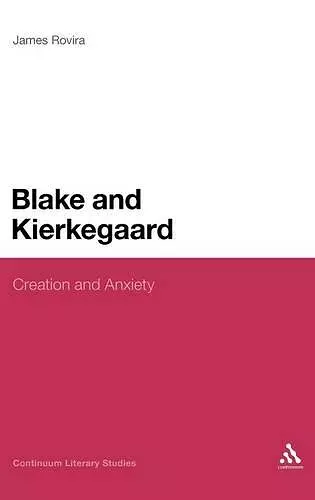Blake and Kierkegaard
Creation and Anxiety
Format:Hardback
Publisher:Continuum Publishing Corporation
Published:26th Apr '10
Currently unavailable, and unfortunately no date known when it will be back

This study applies Kierkegaardian anxiety to Blake's creation myths to explain how Romantic era creation narratives are a reaction to Enlightenment models of personality.
Apocalyptic nightmares that humanly-created intelligences will one day rise up against their creators haunt the western creative imagination. This study applies Kierkegaard's "Concept of Anxiety" to Blake's creation myths to explain how Enlightenment personality conceptions created fear of independently thinking beings.Apocalyptic nightmares that humanly-created intelligences will one day rise up against their creators haunt the western creative imagination. However, these narratives find their initial expression not in the widely disseminated Frankenstein story but in William Blake's early mythological works. This book looks at why we persistently fear our own creations by examining Blake's illuminated books of the 1790s through the lens of Kierkegaard's theories of personality and of anxiety. It offers a close examination of Kierkegaard's and Blake's similar, and to an extent shared, historical milieux as residents of Denmark's and England's political and economic centers. Each author's residence in a major urban center motivated them to develop a concept of innocence closely identified with the pastoral, and to place their respective and similar concepts of innocence within a larger developmental scheme encompassing an ethical and then a religious consciousness. Rovira identifies contemporary tensions between monarchy and democracy, science and religion, and nature and artifice as the source both of Kierkegaard's concept of anxiety and Blake's representation of creation anxiety in his early illuminated books.
Blake and Kierkegaard speak from the same instinct of the human condition and of man's states of anxiety and self-awareness. James Rovira offers a highly nuanced comparative reading of both author's concepts, of innocence and experience, creation and fall, that not only enhances our understanding of the works under consideration but affirms their abiding and life-affirming relevance to modern thought. -- Michael Phillips, Centre for Eighteenth Century Studies, University of York, UK
‘Rovira's book is an involved but extremely rewarding book, one that delves fully into the complex and sophisticated dialectical processes involved in Kierkegaard's thought... Blake and Kierkegaard as a whole is a carefully thought-through and argued text.' -- zoamorphosis.com
"Rovira's comparative study of William Blake and Søren Kierkegaard offers fresh perspectives related to both thinkers in their shared sociocultural moment. Rovira (English, Tiffin Univ.) frames his inquiry within creation anxiety--i.e., the persistent idea that creations will ultimately turn against one in destructive ways. The author makes connections between Frankenstein, Metropolis, and the Matrix trilogy in order to justify the persistence of this anxiety through the last 200 years and to imply that the apprehensions that impacted Blake's and Kierkegaard's thinking--apprehensions resulting from tensions between democracy and monarchy, science and religion, nature and artifice--apply today. Rovira compares and contrasts ideas relating to the progressive development of the subject to show how both resisted mechanistic Enlightenment psychologies that led to creation anxiety: in Blake's case, from innocence through experience toward visionary perspectives; in Kierkegaard's, the differentiation of self from natural, social, and mental environment. Accessible yet provocative, this book makes a significant contribution and offers critical challenges to the scholarship surrounding both figures, and close readings (and re-readings) expose lingering tensions between self and subjectivity. Generous notes and a substantial comprehensive bibliography round out this excellent study. Summing Up: Essential. Lower-division undergraduates and above. -- J. A. Saklofske, Acadia University"- CHOICE
In Blake and Kierkegaard: Creation and Anxiety, Rovira shows much skill in handling both writers on the basis of the comparative premises he sets up. The comparative strategy is a stimulating device…the author proves that there is something to be gained from translating Blakean terms into Kierkegaardian concepts. Through Kierkegaard, we are provided with a fresh sense of how another thinker’s conceptual structures can be used to clarify Blake’s often perplexing mythology. -- Robert W. Rix, University of Aalborg, Denmark * Comparative Literature Studies, Vol. 49, No. 3 *
ISBN: 9781441135599
Dimensions: unknown
Weight: unknown
208 pages